China correspondent
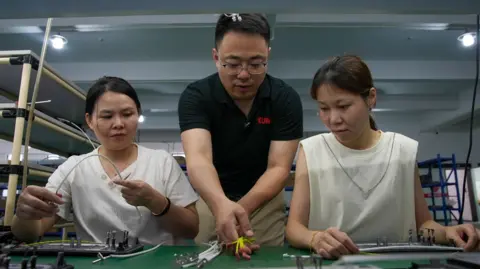 BBC
BBCThere’s a vast empty space in the middle of the factory floor in Foshan in southern China where workers should be welding high-end air fryers for the US market.
Derek Wang says his American customers were wowed by his air fryer models – which are controlled via smartphones and can also bake, roast and grill.
But then on 2 April, Donald Trump’s “Liberation Day” tariffs hit all Chinese goods entering the US, eventually reaching 145% – and his clients asked him to pause production.
“I tried to keep smiling through my anxiety for the sake of my 40 workers,” he told the BBC.
On Wednesday, as a deal to ease the trade war came into effect, Mr Wang said his US buyers were back on the phone.
Both countries still face some tariffs. There is at least a 30% tax on all Chinese goods entering the US and Beijing has kept a 10% levy on American goods coming into the country, down from 125%.
But this surprise agreement after a weekend of negotiations in Switzerland has given factories and businesses some breathing room.
“At this time, our US client is willing to pay for the tariffs. Of course, we had to bargain with them as they asked us to lower some of our costs,” he said.
Mr Wang, who studied engineering in Delaware in the US, spent three years helping develop the air fryer model. It cost him $500,000 to set up his company and he said the tariffs came as a shock.
“It felt like my parents were getting a divorce. China and US are the most important economic and cultural powers in the world. Their sudden separation would lead to a world that we cannot imagine. Tariffs as high as 145% would mean we have to say goodbye to one another.
But he adds, “there’s a saying in Chinese: good fortune comes out of bad”.
Mr Wang believes his “good fortune” is that this trade war has accelerated his plan to diversify away from doing business with America.
This is one of the reasons why Beijing believes it has the upper hand in its negotiations with Washington. China has choices and officials have been actively encouraging the country’s firms to do more business in places like Africa, South America and South East Asia.
Many other Chinese businesses have also told the BBC that they are looking to diversify away from the US to reduce their reliance on the market – suggesting in the long-term there could be more of a separation between the US and China, rather than a divorce.
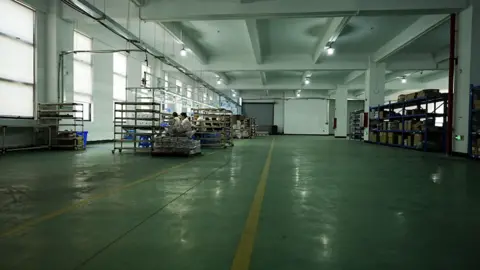
Donald Trump has suggested that he may speak to Chinese President Xi Jinping by the end of this week. The world’s two largest economies will now enter talks after agreeing to a ceasefire in their economic war for 90 days.
Beijing has framed this deal as a win – not just for China but for all countries facing US tariffs.
But it has come at a cost.
A short walk through Shunde district – known as the “capital of home appliances” – presents a sobering assessment of a struggling manufacturing sector.
Factory workers use the cooler evenings in Foshan to let off a little steam. They spill out into every corner of the local park.
During the day they pack, mould and assemble nearly everything that you would find in your kitchen – from gas stoves and washing machines to kettles and fridges.
At night, after leaving work, one group line dances in one corner of the small park, while a heated basketball match takes place in another part.
Posters lining the walls of the streets tout “stable work and easy” jobs involving packing and screwing products for 30 days in a home appliance factory for 16 yuan an hour, to assembling air conditioning units for 20 yuan an hour.
But agents told us that several factories had stopped hiring, especially those linked to the US – some had even shut down parts of their production line.
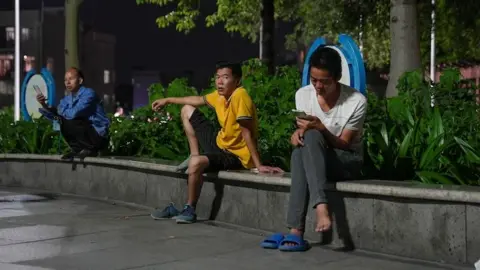
The BBC was told that several of these workers will sleep in the park to save money. Many of them travel to Foshan from their home towns, which can be hundreds of kilometres away.
Several nearby hostels offer rooms for 20 yuan a night, which can be at least an hour’s pay. Many will want to pocket whatever they earn to send it back to their families.
This is the picture of China that President Trump’s team have tried to present – one of sluggish growth, rising unemployment and a chronic housing crisis.
“We’re not looking to hurt China,” Mr Trump said after the trade agreement was announced, while adding that China was “being hurt very badly”.
“They were closing up factories. They were having a lot of unrest, and they were very happy to be able to do something with us.”
This may be overstating Beijing’s economic woes. This country is still leading the world when it comes to the production of electric vehicles and solar panels, and it is making significant headway in artificial intelligence technology.
Officials in China have also continued to stress this country can take the pain of an economic war. But it is being keenly felt by some on the frontline and that may be part of why Beijing has started talking to the US.
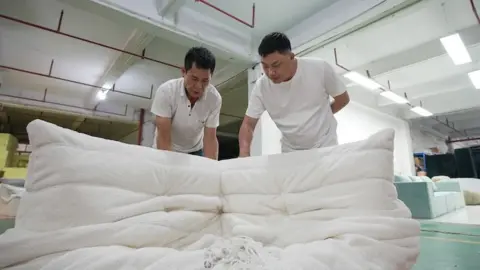
This latest “ceasefire” has prompted a rush of orders between the two countries as businesses wonder if it can last.
He Ke, or HK to his American clients, has called his workers back from their home towns to restart his sofa business, Gongyuan Furniture.
It ground to a halt even before Mr Trump’s tariffs hit 145%.
“We had a day off straightaway,” said Mr He. “Once the tariffs hit 50%, we had already come to a standstill. When they hit 145%, we certainly could not do business. It was just not possible.”
His production line with around 200 workers once took up all four floors of the building.
Since the Covid pandemic, he has only needed one floor and around 40 staff. But he still has the odd high-profile client – he claims Elon Musk sits on one of his sofas.
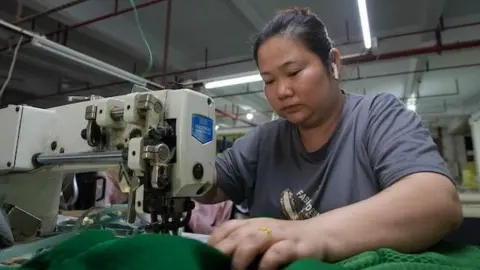
Some workers have already returned and are lifting a soft chair onto a compressor machine to get it ready to box and ship.
Sewing machines hum in the background as workers stitch fabric into the right shape to cover memory foam cushions.
Mr He says he has seen many changes in Foshan since he started making sofas in 2013.
“We feel that the global economy is not good. The domestic economy has also been hit and this affects the life of people here. In the past, when we went out to spend money, we spent a lot of money. We did not think about whether the price was high or cheap. We will buy it as long as we like it. Now, when we want to buy a relatively expensive things, we have to think twice, because the money is not easy to earn.”
Like Mr Wang and his air fryers, Mr He also says he is looking at diversifying his sales away from the US, but he has hope that the world’s two biggest economies can come to an agreement in the next 90 days.
“I am just a small businessman. But I do understand that the game between these two countries is temporary. I think if they want to survive with each other for a long time, they will definitely sit down and talk things over.”

